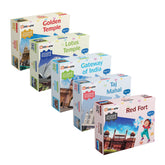10 Uncommon Parenting Tips for 2024: Expert Advice You Need to Hear Now

From nurturing your child's emotional intelligence to encouraging self-care, these pieces of expert advice are designed specifically to help you ensure the well-being of your little ones. We know for a fact that every child is unique, and there’s no one-size-fits-all approach to modern parenting. That's why we've included a diverse range of tips that will help you tailor your parenting style to your child's individual needs.
In addition to practical tips, we've also included some fun and engaging actionable steps that will help you bond with your child and create lasting memories whilst making sure you get to use our provided tips without a hassle. By incorporating these tips and activities into your daily routine, you can create a positive and nurturing environment for your child to thrive.
So, whether you're a new parent or a seasoned pro, these 10 uncommon parenting tips will provide you with the tools and resources you need to raise happy, healthy, and confident children in 2024.
Contents of the Article
Encouraging Kids to Spend Time in Nature

Encouraging kids to spend time in nature is an important aspect of child development. Studies have shown that spending time outdoors can have significant benefits for children's physical, mental, and emotional health. It can improve their cognitive abilities, boost creativity, and promote a sense of well-being.
One of the best ways to get kids excited about spending time outdoors is by letting them explore and engage with nature on their own terms. Give them the opportunity to climb trees, collect rocks or shells, and observe insects or birds. These experiences can spark curiosity and help children develop a deeper connection to the natural world.Actionable Advice: Try to plan at least one outdoor activity with your children each week. Whether it's a walk in the park or a day trip to a nearby hiking trail, make it a priority to spend time in nature as a family. Encourage your kids to explore and engage with the environment around them, and take the time to appreciate the beauty and wonder of the natural world together. Carrying brain teaser toys on travel with your kids can also make the experience more enjoyable while having hours of fun.
Teaching Kids Financial Literacy

Teaching kids about financial literacy from a young age is crucial in ensuring they develop good money habits that will benefit them in the long run. Start by explaining basic financial concepts to your children in simple terms, such as the importance of saving money and the difference between wants and needs.
Consider giving your child an allowance and encourage them to budget their spending. You can also involve them in grocery shopping or other financial decisions to help them understand the value of money.
One way to teach financial literacy is through games and activities that make learning fun, such as a pretend store where kids can practice buying & selling items or a savings challenge where they set a goal to save a certain amount of money. As your child grows older, introduce more complex financial concepts such as investing & credit. Encouraging your child to develop good money habits from a young age will set them up for financial success in the future.
Actionable advice: Consider giving them an allowance and involve them in financial decisions to help them understand money’s value. Start by explaining the importance of saving money to your child & encourage them to budget their spending.
Raising Children Bilingually

As a parent, you may have considered raising your child to be bilingual. But what are the benefits of learning multiple languages and how can you successfully instill this skill in your child?
Firstly, being bilingual has been shown to have numerous cognitive benefits such as improved memory, problem-solving skills, and the ability to multitask. Additionally, bilingualism can help open up a world of cultural & professional opportunities for your child in the future.
So how can you successfully raise a bilingual child? One way to enhance language skills in kids of 6 to 8 year olds is providing them with educational jigsaw puzzles. Mittimate’s Action Word & Opposite Words Puzzle helps children to expand their vocabulary and learn many words.
Actionable advice: Start by consistently exposing your child to both languages from a young age, & make language learning fun & engaging for them with games, songs, and other interactive activities. If possible, immerse your child in the language by visiting places where it's spoken or having them attend language immersion programs.
Mindful Parenting

Mindful parenting involves being fully present and engaged with your child in the moment, without judgment or distraction. It can help strengthen your bond with your child and promote their emotional well-being.
To practice mindful parenting, start by setting aside dedicated time with your child without any distractions, such as phones or TV. Consider engaging in DIY toys or creating a DIY family tree with your child, as these DIY projects enhance family bonding by providing a chance for parents and children to work on a meaningful project together.
It's also important to model mindfulness for your child in your own actions and behaviors. Take breaks when you need to and show your child how to manage stress in a healthy way.
Actionable advice: Encourage your child to practice mindfulness with you by doing activities like mindful breathing, yoga, or meditation together, it really helps build a better foundation for a growing mind. You should also actively set aside time to hang out with your little muffins in a way they feel heard & accompanied.
Raising Emotionally Intelligent Children

Raising emotionally intelligent children is essential for the children’s social & emotional development. As a parent, it's important to teach kids how to identify and express their emotions effectively.
Encourage your child to express their emotions in healthy ways such as talking, drawing, or journaling. Avoid dismissing or ignoring their feelings as it can lead to emotional suppression.
Finally, help your child develop problem-solving skills by teaching them how to find constructive solutions to their problems rather than reacting impulsively. This will develop strong relationships with others.
Actionable Takeaway: Start by creating a safe and supportive environment where your child feels comfortable expressing their feelings. Teach them to identify and label their emotions by using a feeling chart or through storytelling. Encourage healthy ways of expressing emotions. Teach your child empathy by modeling it yourself & encouraging them to consider others' perspectives.
Fostering Creativity

Creativity is a crucial component of a child's development. It allows them to think outside the box & come up with new innovations. Encouraging creativity can also help build a child's confidence & self-esteem, as well as foster a love for learning.
One way to promote creativity in your child is by providing them with a variety of open-ended materials to explore, such as paper, markers, paint, and clay. Additionally, allowing your child to engage in unstructured playtime can help them tap into their imagination and creativity.
Another way to foster creativity in kids is to provide them jigsaw puzzles games as jigsaw puzzles as these puzzles engage kids in problem-solving and critical thinking as they figure out how pieces fit together. This process enhances their spatial awareness and attention to detail, helping them develop fine motor skills and cognitive flexibility.
Actionable advice: Provide your child with a variety of open-ended materials to explore and allow them to engage in unstructured playtime. When praising your child's creativity, focus on their efforts and process rather than just the end result. By doing so, you can help foster their creativity and encourage their love for learning.
Teaching Kids to Cook

Cooking is an essential life skill, and teaching kids how to cook not only helps them develop practical skills but also encourages a healthy relationship with food. Research shows that kids who are involved in cooking are more likely to have a positive attitude toward food and make healthier food choices.
To involve your kids in the kitchen, start by selecting simple and safe recipes that are appropriate for their age and skill level. Encourage them to participate in various aspects of cooking, such as measuring ingredients, stirring, and seasoning. Cooking together can also be a fun family activity that promotes bonding.
Apart from practical skills, cooking also teaches children important life skills, such as following instructions, problem-solving, and time management. Additionally, involving children in the kitchen can boost their confidence and self-esteem as they learn new skills and take on new responsibilities.
Actionable advice: Start involving your kids in the kitchen by selecting simple and safe recipes, and encouraging them to participate in various aspects of cooking. Cooking together can be a fun family activity that promotes bonding and teaches important life skills. Remember to supervise your child at all times and make safety a top priority.
Promoting Positive Body Image

Promoting positive body image is crucial for children to develop a healthy relationship with their bodies and self-image. As a parent, you can play a significant role in promoting positive body image in your child.
Start by modeling positive behaviors and attitudes towards your own body. Avoid negative self-talk and focus on healthy behaviors like eating a balanced diet and engaging in regular physical activity. Help them understand that everyone’s body is different.
It’s also essential to monitor your child’s exposure to media and social media, as unrealistic beauty standards can contribute to negative body image. Encourage your child to appreciate their body for what it can do, rather than how it looks.
Finally, communicate openly and honestly with your child about body image and self-esteem. Encourage them to express their feelings and concerns about their body and offer support and guidance.
Actionable advice: Encourage your child to focus on how their body feels rather than how it looks, and model positive behaviors and attitudes towards your own body. Monitor your child’s exposure to media and social media, and communicate openly and honestly with your child about body image and self-esteem.
Raising Responsible Children

Raising responsible children is an essential aspect of parenting. Children who grow up with a sense of responsibility and accountability are more likely to become successful and independent adults. Instilling responsibility in kids from a young age can be achieved through various methods such as setting age-appropriate expectations, assigning chores, and encouraging decision-making.
Parents can help their children develop a sense of responsibility by creating a routine and sticking to it. This routine can include activities such as getting dressed in the morning, doing homework, and completing chores. Assigning age-appropriate chores can help teach children accountability and the importance of contributing to the family. Encouraging children to make their own decisions, even if it's just choosing between two options, can also help them develop a sense of responsibility and independence.
An essential aspect of raising responsible kids is being consistent with discipline. When children make mistakes or fail to meet expectations, it's essential to hold them accountable while also providing guidance & support. By doing so, parents help their children learn from their mistakes & take responsibility for their actions.
Actionable advice: Create a chore chart that includes age-appropriate tasks for your children and assign them a specific day or time to complete them. Encourage your children to make their own decisions by giving them two options to choose from, such as what to wear or what to eat for a snack. Finally, make sure to be consistent with discipline and provide guidance and support when needed
Raising Empathetic Children

Empathy is an essential quality that helps children develop healthy relationships & emotional intelligence. It's the ability to understand & share the feelings of others, which is crucial for building meaningful connections with family, friends, & peers.
As parents, you can foster empathy in your children from a young age by modeling it in your behavior. Show empathy and kindness towards others, including your children, and they'll learn to do the same. Encourage them to express their feelings and thoughts, listen attentively to their concerns, and validate their emotions.
It's also important to teach children to respect diversity and individual differences, as empathy involves understanding others' experiences and perspectives. Expose them to diverse cultures, encourage them to learn about others' traditions and beliefs, and teach them to embrace differences and similarities.Actionable Advice:
Conclusion

Incorporating values such as empathy, responsibility, and self-care can have a significant impact on a child's development. By instilling these values from a young age and leading by example, parents can help their children become well-rounded individuals who are equipped with the skills and traits needed for success in all areas of life. We hope you liked today’s article. Make sure to come back around every once in a while cause we’re always rooting for the mommies & daddies of our tribe! Alright, folks, see you guys on another one of our blog posts, till then, Happy Parenting!
- 10 qualities of a good parent
- 20 qualities of a parent
- 25 examples of bad parenting
- 5 characteristics of a good parent
- 5 parenting skills
- Good qualities of parents
- Parenting tips for 5 year-old
- Parenting tips for kids
- Parenting tips for new parents
- Parenting tips for students
- Parenting tips for teenagers
- Parenting tips for toddler tantrums
- Parenting tips for toddler tantrums 3 year old
- Parenting tips for toddlers
- Parents advice to their child
- Positive parenting tips for Toddlers
- Teen parenting articles
- toddler tantrums 3-year-old













Leave a comment
Please note, comments need to be approved before they are published.